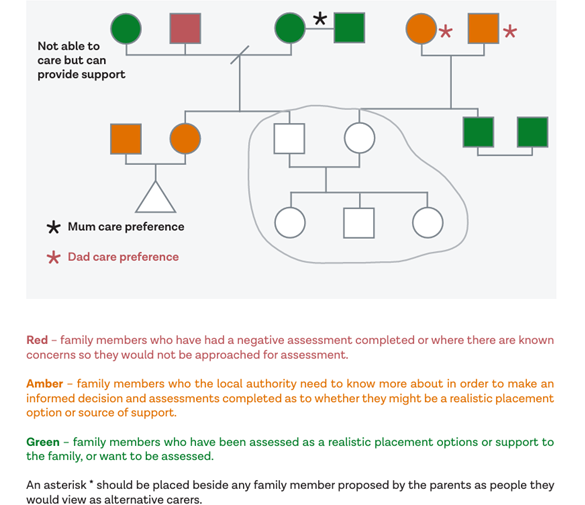Case Law and Legal Summaries provide an overview and analysis of selected cases, highlighting implications for social care practice. This summary shows how the learning can be linked to practitioner development.
This judgment sets out how potential kinship carers can be identified as early as possible. It highlights the importance of early identification and assessment of family members to reduce delay in the family court. This is common in family proceedings, as the judge highlights.
Case summary
Christine was removed from her mother’s care in mid-2022, the day after she was born. Christine’s older brother, Ben, had already been removed and was living with foster carers. The local authority had known that Christine’s mother was pregnant since October 2021. However, they did not identify until February 2023 that Christine’s maternal aunt could be a viable kinship carer for her. Christine was, by then, nine months old.
The judgment uses pseudonyms to protect anonymity.
Timeline of events
Conclusion of first set of proceedings for an older child, Ben, with him remaining in mothers care under a supervision order.
Ben was placed in foster care.
Christine’s mother, Jane, informed the local authority that she was pregnant. Pre-birth assessments commenced and Jane was advised that care proceedings would be issued when the baby was born.
Christine was born and proceedings were issued next day. Christine moved into an interim foster placement. The social work statement detailed Jane’s mother, sister (Daphne) and brother (John). Two other sisters and one brother (Justin) were mentioned but not detailed. Jane was reported to be estranged from her family.
Jane was directed to file an initial statement detailing anyone she wished to be assessed as a potential carer for Christine.
Jane’s statement said she had no family or friends to put forward as alternative carers.
An assessment of Jane was completed by an independent social worker (ISW). This concluded that she was not in a position to look after Christine.
This report however detailed a good relationship with her half-sister, Hannah, and her brother, Justin.
Second care proceedings for Ben concluded with a Special Guardianship Order (SGO) to alternative carers.
The social work manager spoke to Jane and asked about Hannah and her husbands’ ability to care for Christine. Jane said that they would not be able to care for Christine. The manager then spoke to Hannah, who, when understanding Christine may not return to Jane’s care, said she would like to be assessed. This appeared to be the first time this conversation was held between Hannah and a local authority employee.
A viability assessment was completed. It concluded that Hannah and her husband should be assessed as potential special guardians.
Understanding of wider family
The Social Work Evidence Template (SWET), identified Jane’s mother (Patricia), one sister (Daphne) and one brother (John), including their addresses. A genogram was also provided, as per the Public Law Outline in Practice Direction 12a. The statement mentioned that Jane had two other sisters and a brother. The legal bundle gave several references to Jane being estranged from her family. This was also shown on the genogram.
Jane gave instructions that her other sister, Hannah, had said she was not able to care for Christine when Jane asked. It was noted that Jane would not have put forward family members due to her estranged relationship with them, and her belief at that point that Christine would return to her care. She did not have an intermediary at that point, but the judgment notes that she was later supported by one.
It was not understood until an ISW assessment, concluding in October 2022, that Jane had a good bond with Hannah. They saw each other as often as they could and Hannah was moving to be closer to her. She also spoke of a good relationship with her brother. Jane gave the ISW consent to contact them. Hannah stated that they had lost contact for a period of three years but would offer any support she could for Jane to care for Christine. Hannah and her husband had children of their own, whom there were no concerns regarding. It was recommended that a full SGO assessment was completed.
The judge dismissed the criticism that Hannah and her husband had not put themselves forward sooner. Hannah and her husband had not been aware that they could do this, and they had believed that Christine was likely to return to Jane’s care.
Reflections for practice
The judge reflected upon:
Early identification of family members
- Exploration of wider family goes beyond just asking parents who they would wish to nominate.
- Parents should not be solely responsible to identify alternative carers.
- The local authority knew that Jane had three other siblings, but no other details were provided in the initial SWET. This was not acceptable and could have been addressed within pre-proceedings, which also may have allowed assessment of wider family to be completed in this stage.
- The importance of a genogram, not just in identifying family members but this being comprehensive and fully explored. This could be supported by a Family Group Conference. The judge signposted to the Research in Practice resources on genograms and pre-proceedings to support this work.
- Exploration of family should be considered early in proceedings (where this has not been possible/actioned within pre-proceedings) which can be supported by the court if needed.
The importance of minimising delay
- The joint responsibility for social workers and legal practitioners (and indeed the courts) to minimise delay where possible – even where some delay is needed, this should not be longer than necessary.
- Judge Baker highlighted the s1.2 Children Act 1989 message that any delay in determining a child’s upbringing is likely to prejudice their welfare.
- Children, parents and carers deserve better and should not be left in limbo for unnecessary lengths of time. Delayed proceedings also decrease social workers time to be with and helping families in the ‘real world’.
- Resources are scarce in all aspects of the system, making it even more important that the court has capacity to allow delay for the cases that really need it.
Whilst the judgment also speaks of how the court can support exploration of wider family within proceedings, it highlights how Department for Education guidance on information sharing states that:
You do not need consent to share personal information about a child and/or members of their family if a child is at risk or there is a perceived risk of harm.
Whilst a lawful basis is needed, and transparency with carers to work together is best practice, the judge emphasised the proportionality of open and honest conversations with potential carers if this prevents a child being placed in strangers’ care.
For the local authority area in this judgment, it was set out that in the issuing of all proceedings, the local authority must include in initial evidence a genogram with reference to who has been contacted and what their responses were, and details for any alternative carers. Using a colour coded genogram can be an effective way to display this information to the court.

An example of a colour coded genogram
Lessons for practice
This case shows the importance of early assessment and the need for the local authority to lead discussions and remain curious. Parents should not be solely relied on to have the conversations with potential kinship carers as they may not share the full perspective of potential outcomes. This is not a criticism of parents. Care proceedings are an evocative and difficult time for parents. Social workers have a professional duty to lead these difficult and open conversations, remaining curious about what may be happening in the wider network and potential barriers to locating viable kinship carers.
Family members should be brought in at an early stage so that they can be assessed as possible carers and so the support they can offer to keep the child with their parents can be explored.
The judgment also notes the late involvement of an intermediary. Whilst details on this are not given, it is an important reflection that support for parents should be considered at an early stage to ensure their full participation in the proceedings.
Tools to support practice
Explore Research in Practice resources to support practice in this area of work:
Explore a Practice Tool that aims to support practitioners to use genograms in practice. It shares useful guidance, examples and reflective exercises to support practitioners in developing their confidence to use this technique in their everyday practice with children and families, as well as in supervision and reflective practice.
This judgment highlights how vital robust assessment is in the pre-birth period to prevent unnecessary delay. Explore Pre-birth Change Project resources designed to enhance pre-birth services and improve outcomes for infants and parents by driving policy and practice development.
Listen to a podcast that discusses the role of an intermediary in family and criminal proceedings.
Explore an open access briefing on ensuring equality, diversity and inclusion in the Family Court. The briefing includes guidance on working with intermediaries.
View an open access resource hub to support family-centred practice and decision-making in pre-proceedings and the Family Court, including guidance, practice tools, publications, videos and podcasts.
Case Law and Legal Summaries
Research in Practice Partners can access our Case Law and Legal Summaries. These provide an overview and analysis of selected judgments, and highlight the implications for social care practice.
The summaries can be used to support practice, decision making and your continuing professional development.




